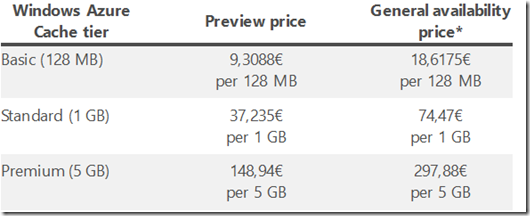Today Microsoft shipped a new bucket of updates and new preview features in Windows Azure platform.
Shortly, following services have been refreshed:
Dedicated Cache Service: Announcing the preview of our new distributed, dedicated, high performance cache service AutoScale: Schedule-based auto-scaling for Web Sites and Virtual Machines and richer AutoScale history logs Web Sites: New Web Server Logging Support to save HTTP Logs to Storage Accounts Operation Logs: New Filtering options on top of Operation Logs As usual Scott has published a brief overview of all features which have been published today.
With today’s announcement of preview availability for the new Windows Azure Cache Microsoft is also announcing the retirement of the current Shared Caching Service and a final decommission date for the Silverlight-based portal.
| New Windows Azure Cache
Windows Azure Cache gives you access to dedicated cache that is managed by Microsoft. By using this distributed, in-memory, scalable solution, you can build highly scalable and responsive applications with super-fast access to data. A cache created using the Cache Service is accessible from applications running on Windows Azure Web Sites, web and worker roles, and Virtual Machines.
The new service differs from the old Windows Azure Shared Caching Service in several key ways: | • | No transaction limits.
Paying based on cache size only, not transactions. | | • | Dedicated cache.
The new service offers dedicated cache for customers who need it. | | • | Better management.
Cache provisioning and management is done through the new Windows Azure Management Portal.
Not, old portal (Silverlight–based one) will be shot down! | | • | Better pricing.
The new service offers better pricing at nearly every price point. Customers using large cache sizes and high transaction volumes gain a major cost savings.
 | | |
Posted
Sep 03 2013, 10:55 PM
by
Damir Dobric